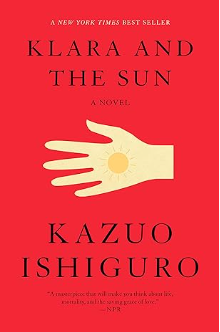Book review*, Klara and the Sun
*I wonder how this review would turn out if I asked the Google Bard AI tool to compose it.
The text in red have been inserted directly from Bard, supplementing my own thoughts and descriptions of the story line.
I found the Bard summary to be straightforward, the background descriptions helpful, and the summary simplistic. On the other hand, one might say the same about my written review, so there you go…

This is a novel from the British author Kazuo Ishigura. Set in the near future, it tells the story of a sort of human robot assistant Klara (the narrator), an AF (Artificial Friend) who starts out her existence in a retail store.
AFs are humanoid robots that are designed to provide companionship and support to humans. Klara is waiting for someone to choose her, and she spends her time observing the world around her and thinking about what it means to be human. She is particularly interested in the sun, which she believes is a source of life and hope.
From her observation point, she believes the sun to be a higher power. Perhaps this is because she was herself solar powered?
A young girl named Josie befriends her and returns with her mother (Chrissie, a single businesswoman) to purchase Klara. They settle in at home, along with a housekeeper named Melania, who was originally cool to the idea of additional help in the household. It appears that Josie has undergone genetic editing, presumably to enhance her intelligence and ability to compete for placement in the better universities. Josie takes ill with a serious undescribed condition which eventually leaves her weakened and bedridden. It is implied that the gene editing procedure may have contributed to her condition. Josie has a lifelong childhood friend and first love Rick who lives nearby. Rick’s mother held him back from genetic procedures and though very bright (he designs drone systems), he has been excluded from higher educational opportunities. The two young friends spend time together, even as they begin to chart different trajectories in their lives. Ricks mother (Helen) and Chrissie’s husband also interact within the storyline.
Though demonstrating great intelligence, social awareness and empathy, Klara is naive to the workings of the world. She attends to Josie throughout the book and tries to help her recover. She sets out to engage the sun’s apparent generosity (in her simplistic worldview) to help Josie recover her health. The story takes us through the illness, family interactions and Klara’s imperfect attempts to assist Josie’s recovery, throughout the arc of Klara’s own life. And until her usefulness is complete.
Like most books that I read it made its mark on me, though I found the reading to be tedious. I liked it but I did not love it. The plot moves slowly with constant detailed observations from Klara’s point of view, and ongoing dialog continues throughout, which slowly reveal the backstory. Klara observes the true feelings and intentions of the human characters and is willing to put her wellbeing at risk to help Josie. She “lives” without judgement or questioning of unfair circumstances, only understanding.
The potential gifts and consequences of our technological future are revealed in this story. As we move forward toward a future of robotic assistance and artificial intelligence, it provides much to consider, especially the power and meaning of unconditional (machine) love. As we further evolve, the yet unknown impacts of artificial intelligence may be by our side.
Per Bard: Klara and the Sun is a beautiful and moving novel about love, loss, and the nature of consciousness. It is a thought-provoking exploration of what it means to be human, and it is sure to stay with you long after you finish reading it.
… The writing is beautiful and lyrical. Ishiguro has a gift for creating vivid imagery and capturing the essence of human emotion.
… The characters are well-developed and relatable. Klara is a sympathetic and compelling protagonist, and I found myself rooting for her throughout the novel.
… The story is thought-provoking and explores some important questions about the nature of consciousness and what it means to be human.
I do not have this same view of the novel, although I agree completely with the third entry. Pick up this book and draw your own conclusions; I would like to hear your thoughts.